Introduction
In the rapidly progressing technological sphere, developers are relying more than ever on advanced tools and support systems to increase their efficiency and productivity. One such tool is Kodezi, a Software Development Kit (SDK) that offers a masterfully pre-assembled set of components to streamline the application development process.
From APIs that enable seamless interaction between applications and platforms, to reusable code libraries that save countless hours of coding, Kodezi provides developers with everything they need to bring their innovative ideas to life with precision and ease. In this article, we will explore the benefits and outcomes of using Kodezi to achieve maximum efficiency and productivity in software development.
What is an SDK?
At the heart of every great application lies a Software Development Kit, more commonly known as an SDK. Ingeniously crafted, an SDK is not just another toolkit—it's a masterfully pre-assembled set of components poised to streamline the application development process. These kits serve as the backbone for software construction, lending developers the tools they need to bring their innovative ideas to life with precision and efficiency.
An SDK typically contains everything from APIs, which enable seamless interaction between the application and its native platform or service, to reusable code libraries that can save countless hours of coding. The treasure trove doesn't end there; comprehensive documentation and tutorials lie within an SDK, guiding developers through the complexities of the kit, ensuring that its full potential can be harnessed. But why is this important, one might ask?
Consider this: a study found that an overwhelming 77% of developers are utilizing ChatGPT, while nearly half are using GitHub Copilot in their development endeavors. This speaks volumes about the modern developer's reliance on advanced tools and support systems such as SDKs, which are now more crucial than ever in this rapidly progressing technological sphere. By leveraging these kits, developers can not only increase their productivity but also keep pace with the evolving demands of software and application users around the world.
What is an API?
Application Programming Interfaces (APIs) serve as the essential conduits facilitating communication and interaction between disparate software applications. Think of APIs as the negotiation table where software kingdoms trade information — through a precise blend of commands and data structures, APIs dictate the exchange protocols across digital realms. Adopting an API-First perspective is crucial; it aligns with a core lesson learned from veteran institutions: discern customer 'needs' rather than 'wants'.
For instance, in building enterprise systems, what users claim to desire may not align with their underlying needs, a notion reflective of the early days when customers yearned for 'faster horses' not realizing the car would revolutionize transportation. Hence, engaging with the users to conceive APIs is vital to ensure they actually deliver value. APIs have now assumed a pivotal role, testament to their ubiquity in the digitally-interwoven fabric of modern software applications.
Their significance is magnified in the context of big data and emerging technologies, with these programming interfaces often hailed as the linchpins of software innovation. Recognizing the untapped potential of APIs, Google has even lauded them as the "crown jewel of software development" because they empower developers to forge sophisticated, interconnected applications. Truly, APIs are the translators that open the doors to new realms of collaborative advancement, ensuring that various software components don’t just coexist but collaboratively thrive.
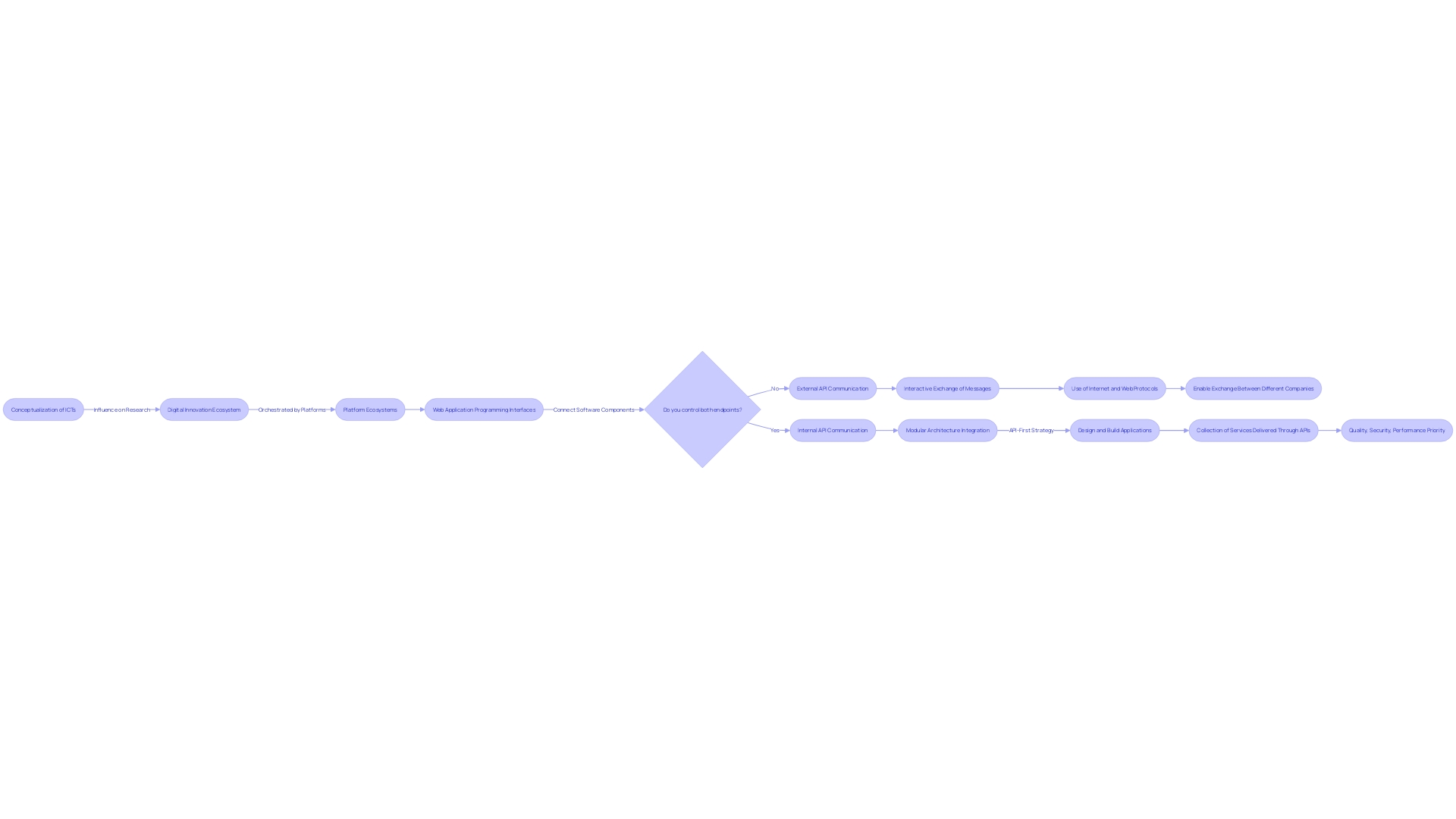
Key Differences: SDKs vs. APIs
Distinguishing between a Software Development Kit (SDK) and an Application Programming Interface (API) is fundamental for developers to harness the appropriate tool for their projects. Reflecting on the 'State of Developer Ecosystem 2023' report, with insights from over 26,000 global participants, it's clear that efficiencies in development practices are pivotal.
An SDK serves as a comprehensive package that includes APIs, reusable code libraries, and oftentimes, documentation and tutorials. These elements converge to accelerate the development cycle and streamline the integration of new features.
APIs, by contrast, are the connective threads that allow distinctly separate software applications to exchange data fluidly. These standard sets of protocols and commands help in achieving interoperability between disparate systems and are critical in an age where seamless digital interaction is paramount. The burgeoning adoption of AI tools among developers, as indicated by the report's finding that 77% use ChatGPT and 46% leverage GitHub Copilot, underscores a trend towards more sophisticated development ecosystems where APIs and SDKs are becoming increasingly crucial.
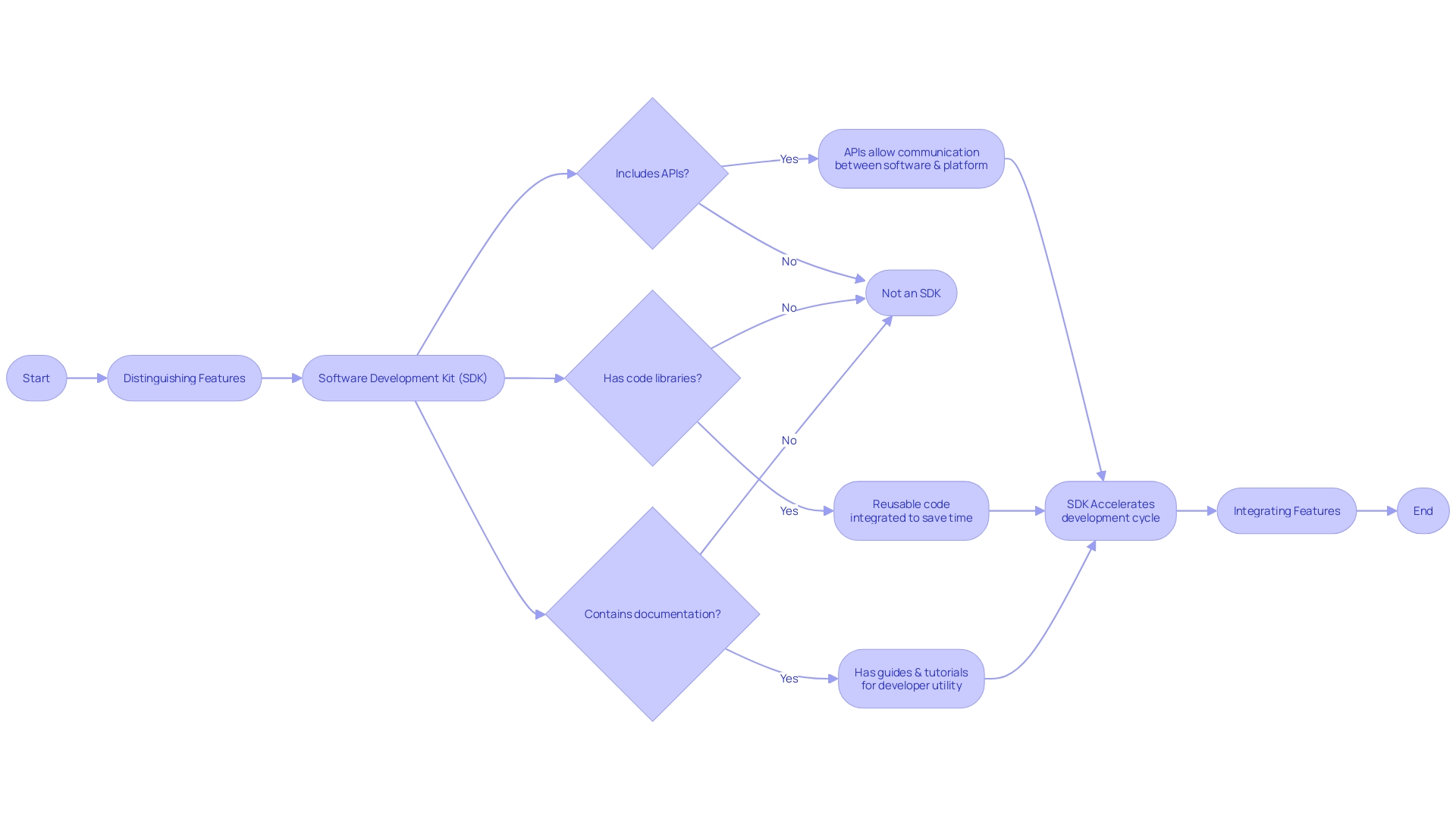
Purpose and Functionality
At the heart of software creativity lies the Software Development Kit (SDK), an indispensable pre-packaged set of coding tools aimed at simplifying the creation of applications for specific platforms. Imagine it as the ultimate development toolbox, encompassing everything from APIs, which are the messengers allowing your app to communicate with a given platform, to a treasure trove of reusable code libraries.
These libraries are a developer's best friend, providing a shortcut to integrating complex functionalities without reinventing the wheel. To top it off, SDKs come with comprehensive documentation and tutorials, paving the way for seamless utilization of their arsenal.
Contrastingly, the Application Programming Interfaces (APIs) act as the linchpins of software interaction, establishing the necessary protocols for apps to converse and swap data. They're the architects of interconnectivity, molding the way applications meld and work synergistically, stretching far beyond mere data retrieval to encompass the complete integration of services.
As our digital ecosystem continues to interweave, APIs and SDKs together set the stage for a harmonious digital symphony, ensuring that apps not only perform but thrive in today's interconnected tableau. In a recent State of Developer Ecosystem report, it's evidenced that developers worldwide are keen on such tools, with a staggering 77% utilizing ChatGPT and 46% employing GitHub Copilot. This surge of interest mirrors the rise of AI as an integral component of development innovation, hinting at a future where AI augments the essence of development efficiency. Embedding such advanced tools into SDKs could be the catalyst to redefine the very nature of application creation, making way for a more intuitive and collaborative development environment.
Language and Platform Support
Understanding the distinction between SDKs and APIs is fundamental for developers engaged in creating versatile and powerful software. An SDK, or Software Development Kit, is a comprehensive package that equips developers with the necessary tools to build applications for specific platforms or programming languages.
For instance, an SDK designed for Python streamlines the development of Python applications, providing developers with APIs, libraries, and documentation that facilitate seamless integration with various services and external platforms. Contrastingly, APIs, or Application Programming Interfaces, serve as universal connectors that enable different software to communicate with each other.
They transcend individual platforms or programming languages, adhering to widely-accepted communication protocols such as REST or SOAP. This flexibility permits applications built in any language to interact with other systems, providing a bridge for data exchange and function invocation across diverse technological ecosystems. From a survey with over 26,000 global respondents, the tech industry's adoption trends are captured in the State of Developer Ecosystem report, revealing that 77% of developers are using AI-powered tools like ChatGPT, and 46% are utilizing GitHub Copilot to streamline coding-related tasks. This underscores the rise in demand for both SDKs and APIs that can integrate with AI technologies to solve complex problems and augment developer efficiency.
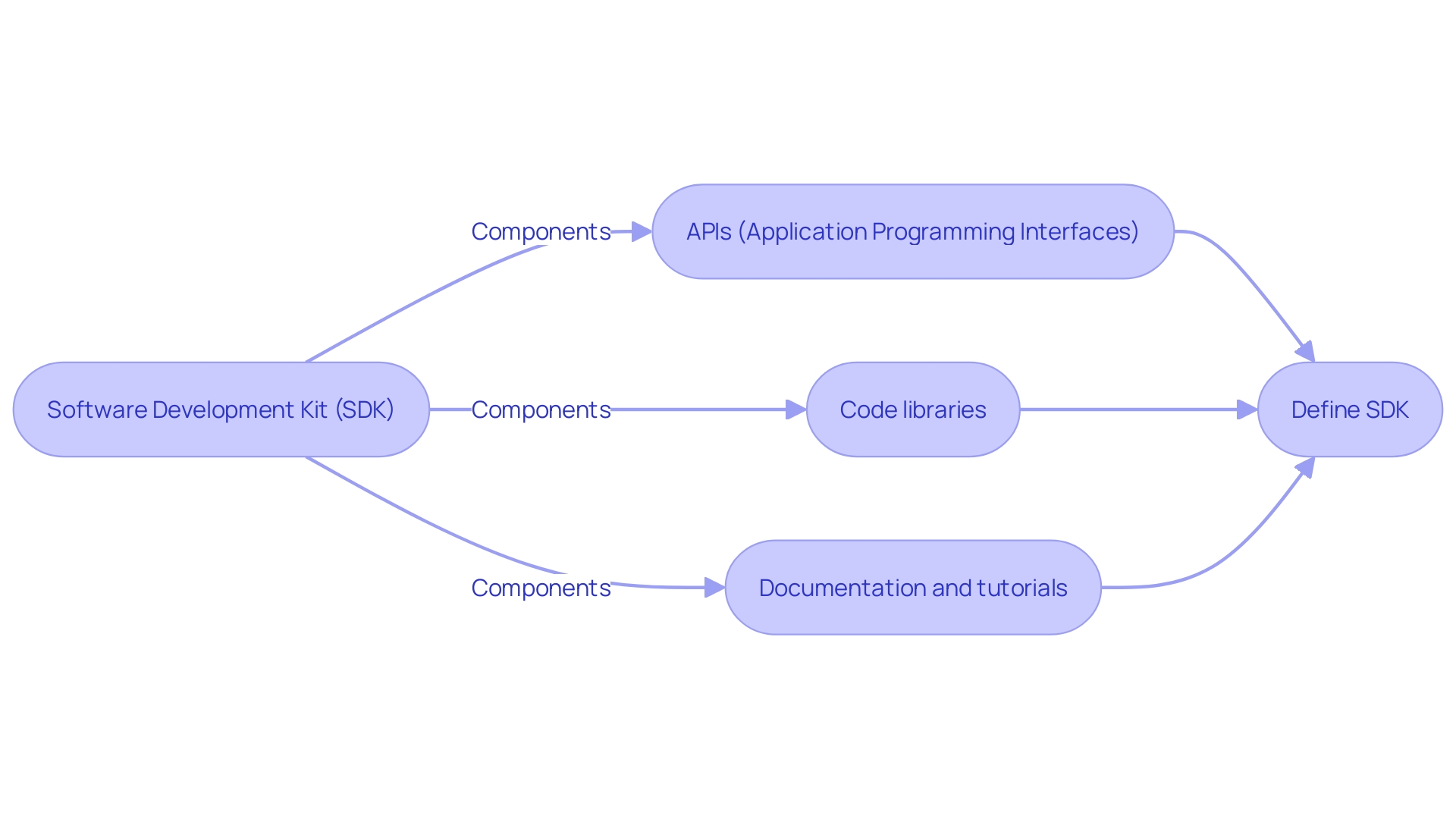
Size and Complexity
Software Development Kits, or SDKs, are the powerhouse tools in a developer’s arsenal, designed to streamline the creation process on specific platforms or for certain programming languages. They offer a neatly packed collection of APIs, code libraries, and thorough documentation, acting like a Swiss Army knife for developers.
Diving deeper, SDKs not only facilitate communication between the app and its platform via APIs but also save programmers time through code libraries that can be easily integrated. They are best described as a pre-packaged set of development aids, enabling seamless app creation with a more expansive and complex structure than single APIs.
The tech landscape is continuously evolving, with growth and democratization becoming key trends. The past few years have seen an influx of varied professional roles in tech, and as of 2023, there are an estimated 13.4 million developers worldwide. With software development consistently expanding, the ability to work effectively and efficiently has never been more important. SDKs respond to this requirement by providing all the building blocks needed for proficient development, including comprehensive guides that help engineers not just build but also understand and maximize the potential of their applications, ensuring a quality software product is delivered every time.
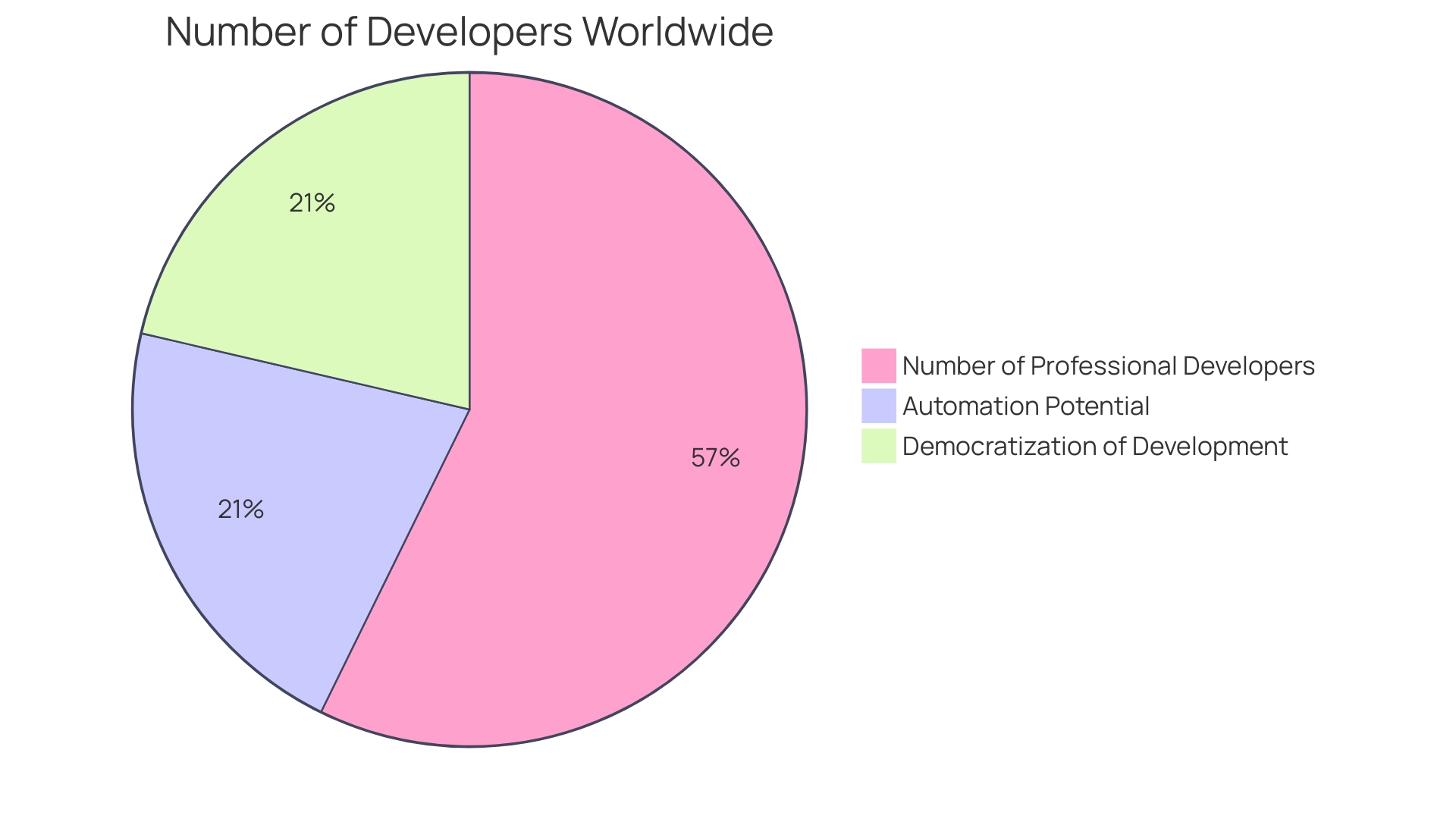
Examples and Use Cases
Understanding the tools essential for software development is crucial for efficient application building. A Software Development Kit (SDK) simplifies this process through a collection of pre-built components.
These kits, tailored for specific platforms or programming languages, offer APIs, code libraries, and often detailed documentation and tutorials. The APIs within SDKs facilitate a two-way communication between the application and its native platform or service, ensuring seamless integration of useful features.
Developers leverage these resources for tasks requiring deep integration, like utilizing native functionalities in iOS or Android apps. The accessible code snippets save significant time by streamlining the incorporation of complex capabilities.
Furthermore, a recent industry report drawing insights from over 26,000 developers underscores the growing reliance on technology, especially with 77% utilizing tools like ChatGPT and 46% adopting GitHub Copilot. This data reflects a trend towards more AI implementation in development tools, signaling developers' willingness to delegate routine coding tasks to AI, thereby optimizing their workflows. Similarly, web developers commonly use APIs independently to connect different systems, enabling them to embed third-party services such as payment gateways or social media features seamlessly into their projects. By harnessing these technologies, developers can tackle the challenge of extracting vital information from complex data formats like PDFs, as encountered by an enterprise sifting through numerous pitch decks. Automated data extraction became feasible by translating textual and graphical content into valuable insights, showcasing the profound versatility and utility of SDKs and APIs in modern software development.
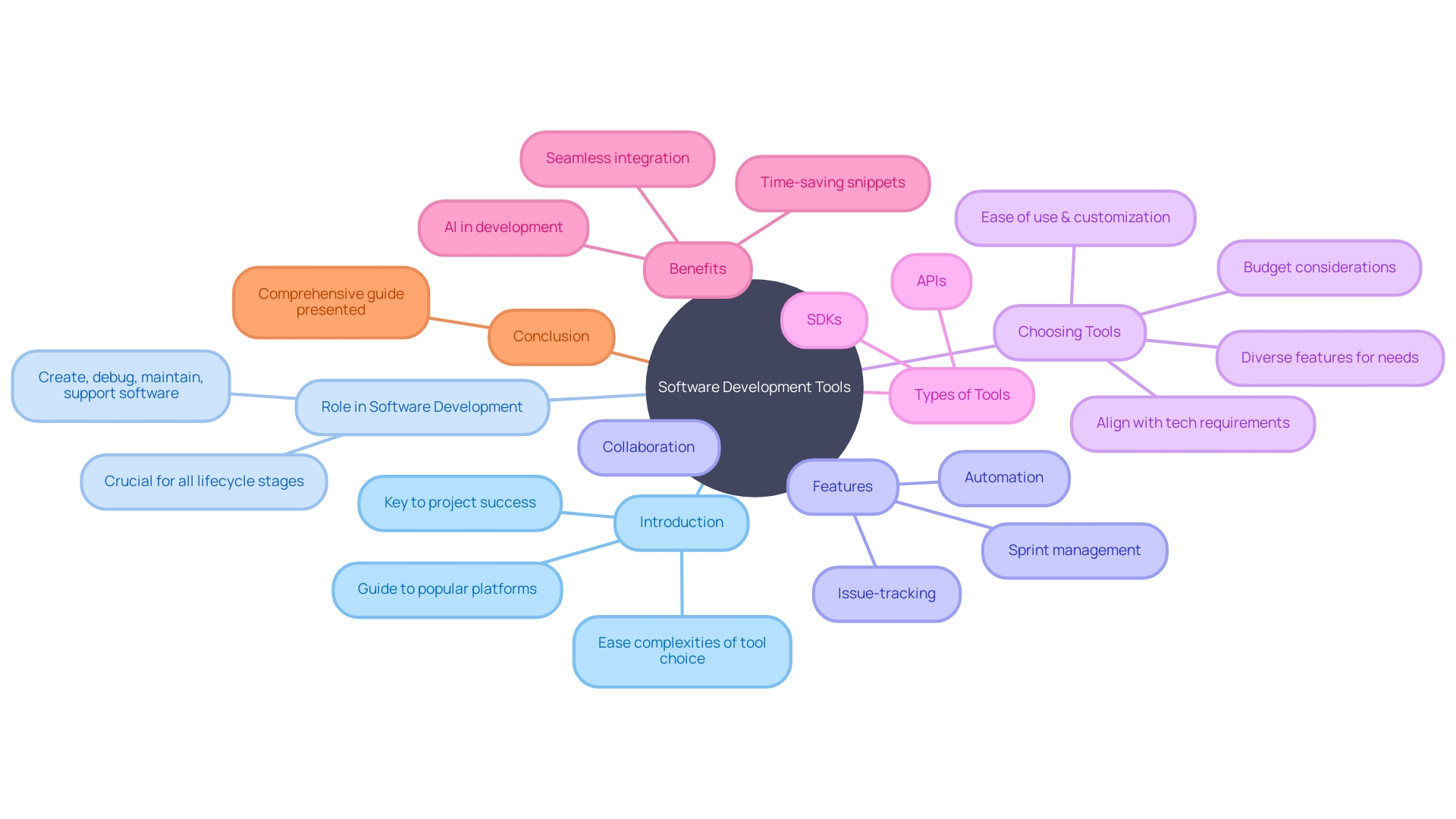
When to Use API vs. SDK
Developers face a pivotal decision when it comes to choosing between an API or an SDK for their project's specific demands. Where extensive integration with a particular system is paramount, an SDK shines due to its all-encompassing suite of tools that cater to the nuances of the targeted platform.
Equipped with APIs, code libraries, and detailed documentation, SDKs serve as a comprehensive toolkit easing development hurdles and fostering functionality on a specific platform. Conversely, APIs are indispensable for fostering communication across diverse applications, acting as vital conduits for data exchange in a multi-platform ecosystem.
With the 'API-First' methodology becoming a dominant strategy in the tech sector, APIs are recognized for their integral role in seamless software interoperability. This strategic decision has far-reaching implications, as evidenced by the State of Developer Ecosystem 2023 report, which encapsulates feedback from over 26,000 developers worldwide. The report reaffirms the importance of choosing the right development tools, with a nod to the burgeoning interest in AI tools like ChatGPT and GitHub Copilot, used by 77% and 46% of developers respectively, illustrating the trend towards sophisticated tooling that can further streamline the development process.
Conclusion
The use of Kodezi as a Software Development Kit (SDK) offers significant benefits and outcomes in software development. By leveraging Kodezi, developers can achieve maximum efficiency and productivity in their projects.
Kodezi provides a masterfully pre-assembled set of components that streamline the application development process. It includes APIs that enable seamless interaction between applications and platforms, as well as reusable code libraries that save valuable time and effort in coding.
The comprehensive documentation and tutorials within Kodezi ensure that developers can fully harness its potential. Using Kodezi ensures that developers can keep pace with the rapidly progressing technological sphere.
The reliance on advanced tools and support systems, such as SDKs, is evident in the industry. Surveys show that a significant number of developers are already using AI-powered tools like ChatGPT and GitHub Copilot, highlighting the demand for efficient development ecosystems.
In addition to increasing productivity, Kodezi supports collaboration and innovation in software development. It acts as a catalyst for redefining the nature of application creation, making way for a more intuitive and collaborative development environment. With the rise of AI as an integral component of development innovation, embedding advanced tools like Kodezi into SDKs augments the essence of development efficiency. In conclusion, Kodezi offers developers the tools they need to bring their innovative ideas to life with precision and ease. By leveraging Kodezi as an SDK, developers can achieve maximum efficiency and productivity, keep pace with technological advancements, and foster collaboration and innovation in software development. With its comprehensive components and support systems, Kodezi is truly a game-changer in the field of application development.
Frequently Asked Questions
What is an SDK?
An SDK, or Software Development Kit, is a comprehensive set of tools that helps developers create applications for specific platforms. It typically includes APIs, reusable code libraries, comprehensive documentation, and tutorials to streamline the development process.
What is an API?
An API, or Application Programming Interface, is a set of protocols that allows different software applications to communicate and exchange data. APIs act as intermediaries that enable distinct software systems to interact seamlessly.
How do SDKs and APIs differ?
SDKs are complete packages that include APIs, code libraries, and documentation aimed at simplifying the development process for specific platforms. In contrast, APIs focus solely on allowing different applications to communicate with each other, facilitating data exchange across various systems.
Why are SDKs important for developers?
SDKs provide a streamlined approach to application development by offering pre-built components that save developers time and effort. They help in integrating complex functionalities without needing to create everything from scratch.
What role do APIs play in software development?
APIs are essential for enabling interoperability among applications. They facilitate communication and data exchange between different software systems, making them crucial in today’s interconnected digital landscape.
When should I use an SDK over an API?
Use an SDK when you need extensive integration with a specific platform, as it provides a suite of tools tailored to that system. Opt for an API when you require communication across multiple platforms or between different systems.
How prevalent is the use of AI tools among developers?
According to a recent report, 77% of developers use AI-powered tools like ChatGPT, while 46% utilize GitHub Copilot. This indicates a growing trend towards incorporating advanced tools to enhance development efficiency.
Can you provide examples of SDKs and APIs in use?
Developers often use SDKs for tasks that require deep integration with native functionalities, such as developing mobile apps for iOS or Android. APIs are commonly employed to connect different systems, such as integrating payment gateways into web applications.
What is the significance of the 'API-First' methodology?
The 'API-First' approach emphasizes designing APIs before developing the actual application. This methodology ensures seamless interoperability and helps in creating more efficient and scalable software systems.
How do SDKs and APIs contribute to modern software development?
Both SDKs and APIs facilitate quicker and more efficient software development by providing essential tools and protocols for building complex applications, thereby allowing developers to focus on innovation and enhancing user experiences.




